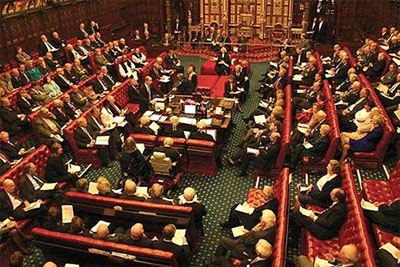UK House of Lords Follow China and Australia, Propose Internet Censorship BillKurt NimmoInfowars Dec. 17, 2009 |
Popular 
Trump, After Rearming Israel, 'Frustrated' With Netanyahu for Expanding War

CNN: U.S. Officials Say Israel Preparing Possible Strike on Iran

U.S. Official Denies Report Trump Team Told Israel 'We Will Abandon You' If You Don't End Gaza War

Trump Confronts South African President on White Genocide

Report: Hamas Says Witkoff Promised to Lift Gaza Blockade in Exchange for Edan Alexander
  As China, Iran, and Australia initiate draconian efforts to shut down the internet as an alternative news source, the House of Lords in the United Kingdom is mulling a similar attempt to block dissenting voices. The so-called Digital Economy Bill, essentially ignored by the media, would allow the Secretary of State to “a technical obligation on internet service providers” at the whim of the government. As China, Iran, and Australia initiate draconian efforts to shut down the internet as an alternative news source, the House of Lords in the United Kingdom is mulling a similar attempt to block dissenting voices. The so-called Digital Economy Bill, essentially ignored by the media, would allow the Secretary of State to “a technical obligation on internet service providers” at the whim of the government.Francis Davey, who offers legal advice to technology and media firms in computer and internet law, notes on his blog that a provision under consideration by the House of Lords — specifically clause 11 of the proposed legislation — would provide the means to block “undesirable” web pages such as WikiLeaks and other whistle-blower sites. The clause would also allow the government to block peer-to-peer networks. The previous clause defines “technical obligation” as follows: A “technical obligation”, in relation to an internet service provider, is an obligation for the provider to take a technical measure against particular subscribers to its service.“As you can see blocking wikileaks is simply a matter of applying a technical measure against all subscribers of any ISP,” writes Davey. “Surely something must limit this power you ask? It seems not.” A few of the Lords, however, believe this sort of obtrusive government intervention is “overly permissive” and they have proposed language modifying the bill. The Digital Economy Bill is under consideration at the same time Australia is implementing a wide-ranging internet filter. “Under the Chinese-style system, Internet service providers (ISPs) in the country would be legally obliged to filter out banned material,” reports Fox News. Australian communication minister Stephen Conroy said the government would be the final arbiter on what sites would be blacklisted under “refused classification.” On December 16, it was reported by the Financial Times that China has imposed additional restrictions on the internet. People registering a domain name in China will have to present a company seal and a business license, the China Internet Network Information Center, a government-backed body, said in a statement on Monday. “Officials said the measure was part of a campaign to rein in pornographic content, but bloggers and internet activists interpreted it as a broader attempt to enforce internet censorship more heavily,” writes Kathrin Hille. On December 6, China indicted dissident Liu Xiaobo for subversion of state power for posting essays on his blog about human rights and calls for democratic reform in the country. Liu Xiaobo faces 15 years in prison. Earlier this month, Iran blocked access to the internet and warned journalists working for foreign news media to remain in their offices for during student demonstrations against the government. On December 6, Tehran residents reported they were unable to access email and that the government’s blockage of opposition web sites was tightened, according to the Associated Press. The European Union, Finland, Denmark, Germany and other countries in Europe have proposed blocking or limiting access to the internet. The European Union’s Justice and Security Commissioner Franco Frattini called last September for ISPs to block access to sites hosting information about bomb-making and the UK’s former Home Secretary Jacqui Smith said in January that she wanted action taken against sites that encouraged terrorism, including social networking sites, according IT World. A free and open internet is enemy number one for government around the world. Alternative news sites such as Infowars and Prison Planet stand in the way of implementing world government currently being formulated in Copenhagen and the New World Order’s control grid. WikiLeaks and Cryptome have leaked numerous documents revealing government corruption and malfeasance. In early 2008, WikiLeaks was forcibly censored at ex-parte and its name deleted from a Californian domain registrar after the transparency website posted a document detailing a money laundering case in the Cayman Islands. Earlier this month Cryptome received a takedown order under the DMCA (an international copyright treaty) after the site posted 17-page guide describing Yahoo's data retention policies and the surveillance capabilities it provides law enforcement. |



